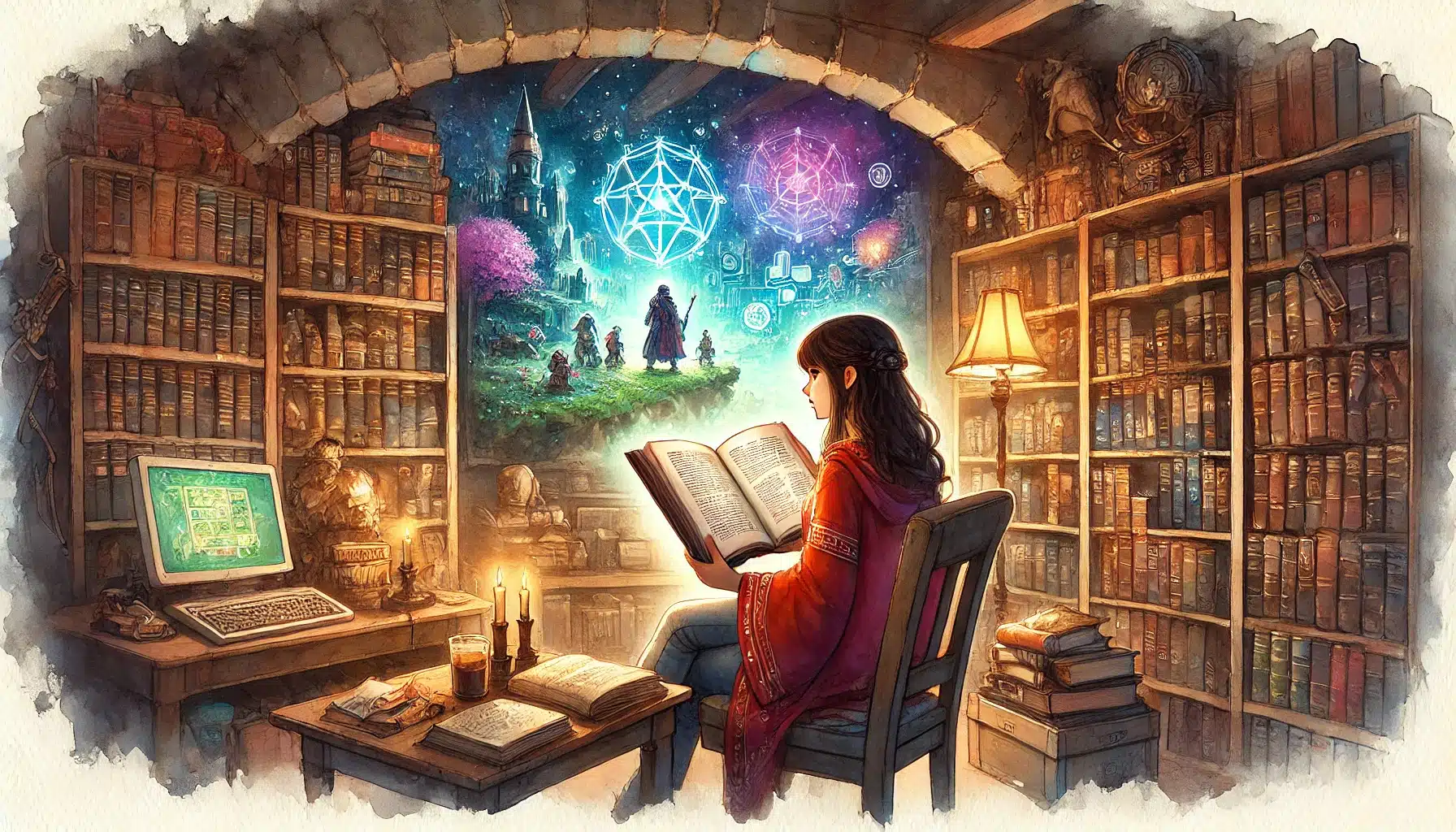Ever stumbled upon a book where the main character levels up, gains skills, and embarks on quests like they’re in a video game? Welcome to the world of LitRPG, short for Literary Role-Playing Game. This unique genre fuses the immersive storytelling of fantasy literature with the mechanics of role-playing games, creating a reading experience that feels like you’re inside your favorite RPG.
But what is LitRPG, and what sets it apart from traditional fantasy? At its core, LitRPG takes the fundamental elements of video games – character stats, experience points, quests, and loot – and weaves them into the fabric of a novel. The result is a story where character growth isn’t just metaphorical, but quantifiable. Heroes don’t just become braver or wiser; they literally level up, improving their strength, intelligence, or magical abilities in ways readers can see and measure. This blend of gaming and storytelling creates a uniquely engaging experience that’s captivating readers worldwide.
The Building Blocks of LitRPG Stories
Ever picked up a book where the main character levels up like they’re in a video game? Welcome to the world of LitRPG! This genre blends the best of fantasy literature with role-playing games, creating a unique reading experience. Let’s break down what makes these stories tick.
Game-Like World
LitRPG throws readers into a setting that works like a game. Picture a medieval fantasy realm or a futuristic space opera, but with a twist – everything runs on game logic. Characters might see floating status screens or hear system announcements as they explore.
These game-like elements aren’t just window dressing. They’re woven into the fabric of the story, influencing how characters interact with their environment and each other. In some LitRPGs, the entire world might be a virtual reality game. In others, game mechanics might suddenly appear in an otherwise normal world, throwing everyone for a loop.
The beauty of these game-like worlds is how they blend the familiar with the fantastic. Readers who’ve spent hours immersed in RPGs will find themselves right at home, while those new to gaming concepts will discover a fresh and exciting take on fantasy and sci-fi settings.
Try my AI Tabletop RPG generators...and an extensive library of content!
Character Progression
In LitRPG stories, character growth takes on a whole new meaning. It’s not just about emotional development or overcoming personal challenges – though these elements are still important. Instead, characters in LitRPG stories experience growth in a way that’s both tangible and measurable, much like leveling up in a video game.
This progression system is a core element of the genre, providing a clear and satisfying sense of advancement throughout the story. Let’s dive into the key aspects of character progression in LitRPG:
Leveling Up is Life
In the world of LitRPG, gaining levels isn’t just a neat bonus – it’s often a matter of life and death. Characters start their journey as beginners, often with low stats and limited abilities. As they face challenges, defeat monsters, and complete quests, they gain experience points (XP) and eventually level up.
Each level brings new possibilities. Characters might become stronger, faster, or smarter. They could unlock new skills or improve existing ones. This constant growth keeps readers engaged, as they root for their favorite characters to overcome increasingly difficult challenges.
⚔️ Fantasy RPG Random Tables Books
Make life as a Gamemaster easier…
If you play Dungeons & Dragons, Pathfinder, or other fantasy RPGs, this
RPG random tables series
is packed with encounters, NPCs, treasure, and more. Available in eBook or print—either way, you’ll have a wealth of adventure ideas at your fingertips.
The leveling system also adds an extra layer of tension to the story. Characters might find themselves in situations where they’re outmatched, forcing them to get creative or grind for more XP before tackling a tough boss or quest.
Stats, Skills, and Abilities
Gone are the days of vague descriptions like “he was strong” or “she was clever.” In LitRPG, characters have concrete stats that define their capabilities. Strength, Dexterity, Intelligence, Charisma – these aren’t just abstract concepts, but numerical values that can be improved over time.
Along with stats, characters develop a range of skills and abilities. A warrior might level up their sword-fighting skill, while a mage could learn new spells. These skills often come with their own progression systems, adding depth to character development.
The beauty of this system is how it allows for diverse character builds. One fighter might focus on heavy armor and defensive abilities, while another opts for speed and critical hits. This variety keeps things interesting, both for the characters and the readers.
Plot Drivers
LitRPG stories don’t just rely on character growth to keep things interesting. They also incorporate unique plot elements that blend gaming concepts with traditional storytelling. Let’s explore some of the key plot drivers in LitRPG:
Quests and Missions
Just like in video games, LitRPG characters often find themselves tackling specific tasks or missions. These quests serve multiple purposes in the story:
- Plot Advancement: Quests often drive the main storyline forward, giving characters clear goals and motivations.
- Character Development: Completing quests allows characters to gain experience, level up, and acquire new skills or items.
- World Building: Through quests, readers learn more about the game world, its inhabitants, and its rules.
Quests in LitRPG can range from simple fetch tasks to epic world-saving adventures. They might involve solving puzzles, defeating powerful enemies, or navigating complex social situations. The variety keeps readers engaged and excited about what challenge comes next.
Real Stakes in a Virtual World
Many LitRPG stories take place in virtual reality games, but that doesn’t mean the stakes aren’t real. Authors find creative ways to raise the tension:
- Permadeath: Some stories feature games where dying means losing everything – your character, progress, and items.
- Real-World Consequences: Success or failure in the game might affect the character’s life outside the virtual world.
- Trapped in the Game: A common trope involves characters being unable to log out, turning a game into a life-or-death situation.
- Economic Ties: In some stories, in-game success translates to real-world wealth, raising the stakes of every adventure.
These high-stakes scenarios keep readers on the edge of their seats, even when the action takes place in a virtual world.
The Role of NPCs and AI
Non-Player Characters (NPCs) play a unique role in LitRPG stories. Unlike in traditional fantasy where all characters are assumed to be “real,” LitRPG often blurs the line between AI-controlled NPCs and genuine characters.
Some stories explore themes of AI sentience, with NPCs developing beyond their programming. Others use NPCs as a source of humor, playing with video game tropes like repeating dialogue or bizarre quest requirements.
The interaction between players and NPCs adds another layer of complexity to LitRPG worlds, raising questions about reality, consciousness, and the nature of relationships in virtual spaces.
Crafting and Economy
Many LitRPG stories incorporate detailed crafting systems and in-game economies, mirroring features found in MMORPGs and other video games. These elements add depth to the world and provide alternative paths for character progression:
⚔️ Fantasy RPG Random Tables Books
Make life as a Gamemaster easier…
If you play Dungeons & Dragons, Pathfinder, or other fantasy RPGs, this
RPG random tables series
is packed with encounters, NPCs, treasure, and more. Available in eBook or print—either way, you’ll have a wealth of adventure ideas at your fingertips.
- Crafting: Characters might specialize in creating weapons, armor, potions, or other useful items. This can be a source of income or a way to equip themselves for tough challenges.
- Trading: In-game markets and player-to-player trading can be a major focus, with some characters making their way as merchants rather than warriors.
- Resource Management: Characters often need to balance their resources, deciding whether to spend money on equipment, skills, or other necessities.
These systems give LitRPG worlds a sense of life and complexity beyond combat and questing, allowing for a wider range of character types and storylines.
What is LitRPG?
LitRPG as a genre offers a unique blend of gaming concepts and traditional storytelling. By incorporating elements like tangible character progression, quest-driven plots, and game-like worlds, these stories create an immersive experience that resonates with both gamers and fantasy enthusiasts.
The genre continues to evolve, with authors finding new ways to play with gaming tropes and push the boundaries of what’s possible in a LitRPG world. Whether you’re a die-hard gamer or just someone looking for a fresh take on fantasy, LitRPG offers a reading experience like no other.










